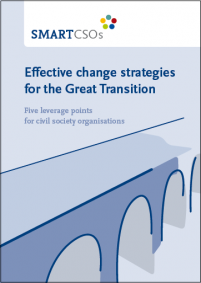Effective Change Strategies for the Great Transition. Five leverage points for civil society organizations
"According to WWF's most recent Living Planet Report (WWF 2010), humanity's demand on the Earth's biocapacity is now exceeded by 50%. Two years earlier the overshoot was still at 30%. Most trends indicating the health of the planet's ecosystems with its vital supplies for human life like food and freshwater are negative. This course is directly linked with the rapidly increasing demands for natural resources of a growing global consumer class that is enjoying unprecedented levels of material wealth. At the same time billions of people on the planet still live in poverty while inequality in many countries is on the rise.
A myriad of civil society organisations (CSOs) all over the planet are working hard to tackle global environmental and social challenges. Yet, in spite of the many successes, the global sustainability crisis remains unresolved and is indeed becoming dangerously severe at many fronts. As Gustave Speth (2008: 78) puts it: "We have won many victories, but we are losing the planet. It is important to ask why." This paper has the ambition to stimulate debate among CSO leaders and strategists, funders and academics about the adequateness of current CSO strategies. It analyses where potential weaknesses of current CSO strategies can be found. Subsequently - drawing on knowledge from theory and practice across a range of disciplines - the paper suggests a number of leverage points that CSOs can explore to develop more effective strategies and become stronger change agents towards tackling the global sustainability crisis. The paper refers to the larger professionalized environmental and developmental CSO networks as a starting point for our analysis. Therefore much of the analysis and recommendations apply foremost to these types of organisations. However, because successful future civil society strategies that aim to tackle the sustainability crisis will depend on a very broad collaboration between smaller CSOs and grassroots, faith groups and unions up to an including large international CSO networks, we will try to be inclusive in our analysis and considerations.
This paper is the result of discussions and research undertaken in the Smart CSOs Initiative, a community of practice consisting of leaders from civil society organisations, academics and funders exploring how CSOs can become stronger change agents towards the Great Transition to a sustainable society and economy.
[...]
The paper is not suggesting the silver bullets for tomorrow's successful CSO strategies. The authors acknowledge that the research areas touched upon in this paper are very diverse, broad and challenging. Due to resources and time limits they could not be analysed in depth. However, we hope that our efforts will be a valuable contribution to the debate at the conference and beyond. At the conference, we hope that together with the invited CSO leaders, academics and funders we can take our current thinking to the next level and develop practical ways forward that can build on the work so far."




